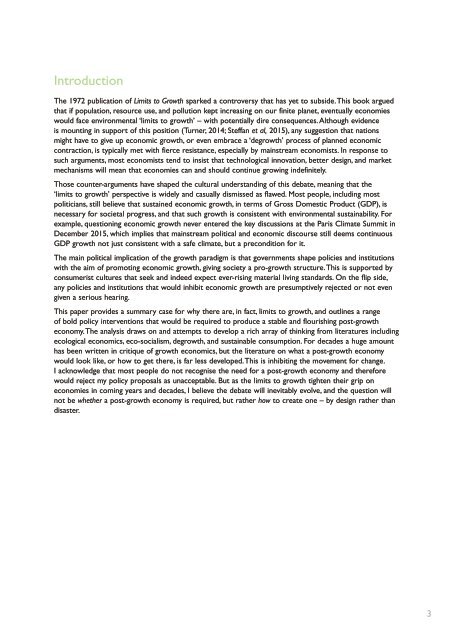peerreviewed Fellow
MSSI-IssuesPaper-6_Alexander_2016
MSSI-IssuesPaper-6_Alexander_2016
Create successful ePaper yourself
Turn your PDF publications into a flip-book with our unique Google optimized e-Paper software.
Introduction<br />
The 1972 publication of Limits to Growth sparked a controversy that has yet to subside. This book argued<br />
that if population, resource use, and pollution kept increasing on our finite planet, eventually economies<br />
would face environmental ‘limits to growth’ – with potentially dire consequences. Although evidence<br />
is mounting in support of this position (Turner, 2014; Steffan et al, 2015), any suggestion that nations<br />
might have to give up economic growth, or even embrace a ‘degrowth’ process of planned economic<br />
contraction, is typically met with fierce resistance, especially by mainstream economists. In response to<br />
such arguments, most economists tend to insist that technological innovation, better design, and market<br />
mechanisms will mean that economies can and should continue growing indefinitely.<br />
Those counter-arguments have shaped the cultural understanding of this debate, meaning that the<br />
‘limits to growth’ perspective is widely and casually dismissed as flawed. Most people, including most<br />
politicians, still believe that sustained economic growth, in terms of Gross Domestic Product (GDP), is<br />
necessary for societal progress, and that such growth is consistent with environmental sustainability. For<br />
example, questioning economic growth never entered the key discussions at the Paris Climate Summit in<br />
December 2015, which implies that mainstream political and economic discourse still deems continuous<br />
GDP growth not just consistent with a safe climate, but a precondition for it.<br />
The main political implication of the growth paradigm is that governments shape policies and institutions<br />
with the aim of promoting economic growth, giving society a pro-growth structure. This is supported by<br />
consumerist cultures that seek and indeed expect ever-rising material living standards. On the flip side,<br />
any policies and institutions that would inhibit economic growth are presumptively rejected or not even<br />
given a serious hearing.<br />
This paper provides a summary case for why there are, in fact, limits to growth, and outlines a range<br />
of bold policy interventions that would be required to produce a stable and flourishing post-growth<br />
economy. The analysis draws on and attempts to develop a rich array of thinking from literatures including<br />
ecological economics, eco-socialism, degrowth, and sustainable consumption. For decades a huge amount<br />
has been written in critique of growth economics, but the literature on what a post-growth economy<br />
would look like, or how to get there, is far less developed. This is inhibiting the movement for change.<br />
I acknowledge that most people do not recognise the need for a post-growth economy and therefore<br />
would reject my policy proposals as unacceptable. But as the limits to growth tighten their grip on<br />
economies in coming years and decades, I believe the debate will inevitably evolve, and the question will<br />
not be whether a post-growth economy is required, but rather how to create one – by design rather than<br />
disaster.<br />
3


